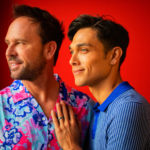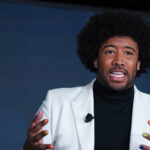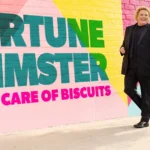Famed queer director Luca Guadagnino (best known for Call Me by Your Name) has reteamed with scribe Justin Kuritzkes to helm the adaptation of a loosely autobiographical novella “Queer” by William S. Burroughs about a May-December love affair between two men, set in the 1950s. Their previous collaboration (Challengers) which starred Zendaya, Mike Faist and Josh O’Connor in a provocative sweaty love triangle set in the world of professional tennis, never quite delivered its promise. This latest collaboration, however, exists on an entirely different level, earning its place alongside Andrew Haigh’s All of Us Strangers amidst a queer cinematic renaissance of films grappling with the intricacies of queer relationships admist larger existential questions. Guadagnino first read the book as a teenager and instantly connected with the material, describing the film as “
The film stars Daniel Craig as William Lee (a queer novelist and drug addict) living in Mexico during the 1950s who is drawn to a much younger American soldier. Craig’s performance obliterates any shred of his James Bond persona, rendering a thoroughly convincing and compelling individual who aggressively pursues the object of his desire. It is, by my estimation, a career-defining performance by Daniel Craig who takes on the unapologetically queer role with a balls-to-the-wall fervor and turns in a finely nuanced performance. Drew Starkey co-stars as Eugene Allerton, the object of Lee’s affection, and provides the perfect yin to Daniel Craig’s yang. The film effectively blurs the line between a relationship that teeters on a knife’s edge between codependent and interdependent. From the start, Craig sets the tone, shamelessly courting the young soldier in a manner that is tragically comedic. There’s a bit of a cat-and-mouse foreplay which makes their eventual physical union all the more satisfying. Visually, Guadagnino couldn’t have chosen a better partner in Starkey who bears an uncanny resemblance to Daniel Craig as we might have imagined him as a younger man 25 years his junior — which sets up a subliminally narcissistic dynamic. Starkey’s performance is thoroughly internal so that it’s more about watching his body language, his non-verbal cues and micro-expressions down to the way he eats a meal while Lee romances him. It’s a nuanced look at the “sugar daddy” relationship showing the ties that bind and repel these two individuals.
As with Call Me by Your Name, Guadagnino allowed his two leads to spend plenty of time together before filming began to allow the chemistry to develop, so that when you see them onscreen there’s a fluidity to their movement and an emotional connection that reverberates under the surface. He even brought in a choreographer to help the actors prepare for a body-melding dance/dream sequence toward the latter part of the film after they partake in an ayahuasca ceremony in the jungles of Ecuador. Another great surprise in this film is a fine supporting performance by a virtually unrecognizable Jason Schwartzman (best known for his eccentric roles in Wes Anderson films). Schwartzman might have seemed an odd choice for the sexually adventurous gay playboy but is pitch perfect in a thoroughly original performance which shows his range in a whole new light. Queer is now open in theaters.
love story from a specific generation to another generation. I hope audiences feel the anguish of William Lee and his epic love for Eugene Allerton and learn from the beauty of their bond.”
Last modified: December 11, 2024














